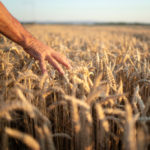He has a degree of doctor of agricultural sciences in the field of selection and seed farming of field crops.
Academician of the International Academy of Ecology, Man and Nature Protection Sciences “MANEB” (St. Petersburg, Russia).
The author of twelve inventions confirmed by author’s certificates and more than sixty scientific works.
Participated with reports and presentations at more than 40 international symposia and conferences. He was a member of the sorghum cultures section of the Academy of Agricultural Science of the USSR.
Since 1964 actively engaged in research work in the field of selection and seed farming of field crops. He held leading scientific positions in specialized structures of the Academy of Sciences of Moldova and other departments: Department of genetics, Experimental selection station, Moldavian research Institute of corn and sorghum, Institute of plant protection and ecological agriculture, currently works at the Institute of genetics, physiology and plant protection.
He is the author of 20 hybrids of sorghum, released in Moldova, Kazakhstan, Belarus, Ukraine, Russian Federation and Romania.
Under the guidance and with direct participation of the breeder G. Moraru in the Republic of Moldova was created a large gene pool of sorghum crops, consisting of more than 2.4 thousand self-pollinated and sterile lines of grain, sugar, broom sorghum and sudan grass. Donors of valuable characters were identified, including for creation of hybrids with hyper-vegetative and reproductive heterosis.
A meaningful scientific implementation of Dr. G. Moraru is a newly developed sorghum plant with a vitreous grain endosperm similar to rice and named by the author – soriz, as a result of a combination of the words sorghum and oryzoidum.
Soriz grain is used in the food industry to produce similar food products that are produced from rice grains. In cooperation with scientists from the Technical University of Moldova technologies have been developed to produce a set of gluten-free food products from soriz food grains for public catering, including children with celiac disease.
Much attention deserve the four created zoned hybrids of sugar sorghum with the same morphological characteristics and utilization of sugar cane, called by the author – sorghum arundinaceous, short – sorgreed (eng.) and “соргрид” to use in Cyrillic language countries. These hybrids satisfactorily tolerate soil salinization, assimilate from the atmosphere up to 50-55 t/ha per year CO2 (deciduous forests of temperate latitudes only up to 16-18 t/ha per year CO2), are resistant to lodging and well adapted to mechanized cultivation and harvesting. Biomass productivity is up to 80-90 t/ha without irrigation and more than 150-180 t/ha – under irrigation. Thus, the hybrid “Porumben-4” in the international variety testing of the European Union in 2008 stood out as a leader in productivity with a biomass yield of 184 t/ha.
From the biomass of these hybrids cultivated in different areas of the Republic of Moldova were obtained: food sugar syrup, complete feed, bioethanol, energy pellets, etc. The resulting sugar syrup is similar in its characteristics to bee honey, with the priority of the possibility of treating people with diabetes.
Cultivation of hybrids of sorghum is possible without the use of herbicides and plant protection products. Moreover, it was found out that having deep penetrating root system, the sorgreed hybrids on radioactive soils ensure the production of biomass suitable for animal feed and produce more quality products, including milk for baby food.
Biological indicators and the achieved production results of sorgreed hybrids, bring them to the rank of the most highly effective fodder, technical, energy and environmental crops, being an alternative to sugar cane of the tropics and promising, in all the above purposes, for cultivation in latitudes with a temperate climate (up to 55th parallels) of both hemispheres.
Being engaged for more than 50 years in selection of cultivated plants, I tend to believe that most of the plants that provide food to Man, are imported objects on our Planet by the Supreme Creator and provided to Man for consumption. And the allocated sorghum cultures, with a valuable complex of biological and economic advantages, can be considered for today the most perspective plants from a family of the cereals introduced in areas of North Africa with the long period of the most severe drought where plants of other families effectively can’t be cultivated. About the introduction of all living diversity of our Planet from the outside is clearly stated in numerous extant written sources of antiquity and clearly interpreted by folk tales of most peoples inhabiting the Earth.
The arguments put forward in defense of Darwin’s evolution remain unconvincing and unproven, since no intermediate, transitional forms of the earth’s evolution have yet been found preserved in living or fossil form, and there is still no created conceptual model that convincingly simulates the passage and transition stages of the promoted evolutionary process.
I am sure that today people in the pursuit of profit, ignoring the negative consequences of its activities on earth continue to destroy the established divine harmony of the living world on our Planet. So human activity has already led to irreparable losses in many regions of the world about 40% of soil fertility, destructive pollution of river basins, lakes and seas, as well as a sharp environmental destabilization. At the same time, along with the increase every year of excessive mechanization and chemicalization in the agricultural sector and in industrial structures, a catastrophic danger for mankind is the introduction of genetically modified plants into agricultural production, which can lead to the loss of genetic stability not only of related families and species of cultivated plants, but also of their consumers, including among them the arsenal of domestic animals and the human community itself.
Humanity is obliged immediately to suspend the destructive anthropogenic processes carried out by both individual groups of people and entire States for their own selfish commercial and political purposes, bringing enormous harm to the natural functioning of Nature. In contrast, there is a need for immediate, urgent, total mobilization of the public and governments of all States to carry out urgent restoration of the global cataclysms. Otherwise, after the next few decades, the growing rapidly all-encompassing imbalance in Nature can become fatally irreparable. And it will be almost impossible to stop the launched global natural disaster, even with the involvement of the entire world budget, together with the scientific, technical and economic base of the entire world community.
The problem of increasing the necessary volumes of additional high-quality food for the rapidly increasing number of the world community is also relevant and urgently needs to be addressed. This problem is very acute in a number of densely populated regions, which have been exposed to increasing droughts and increasing freshwater scarcity in recent years, accompanied by a continued decline in agricultural land.
The solution of certain issues of the critical situation with food security in the world can be achieved by revealing the poorly used genetic potential of the invasive plants, primarily from the number of tropical, exotic species. To this end, new technological approaches and more effective methods of cultivation should be found and proposed that can provide the grown plant with appropriate stress-free “comfortable conditions” of vegetation, providing a more complete utilization of the genetic potential of a particular genotype to obtain the maximum and high-quality crop in a shorter period of vegetation.
Today everywhere it is necessary to implement a systematic transition from traditional soil agriculture to the phytomodular one without substrate and multi-tiered crop production. This will allow the soil to rest, release from agricultural circulation huge areas of inefficient land (sloping, saline and degraded), to ensure effective crop production anywhere in the world, eliminating transport costs and providing access to high-quality, inexpensive and fresh crop production for the entire population of the Earth.



